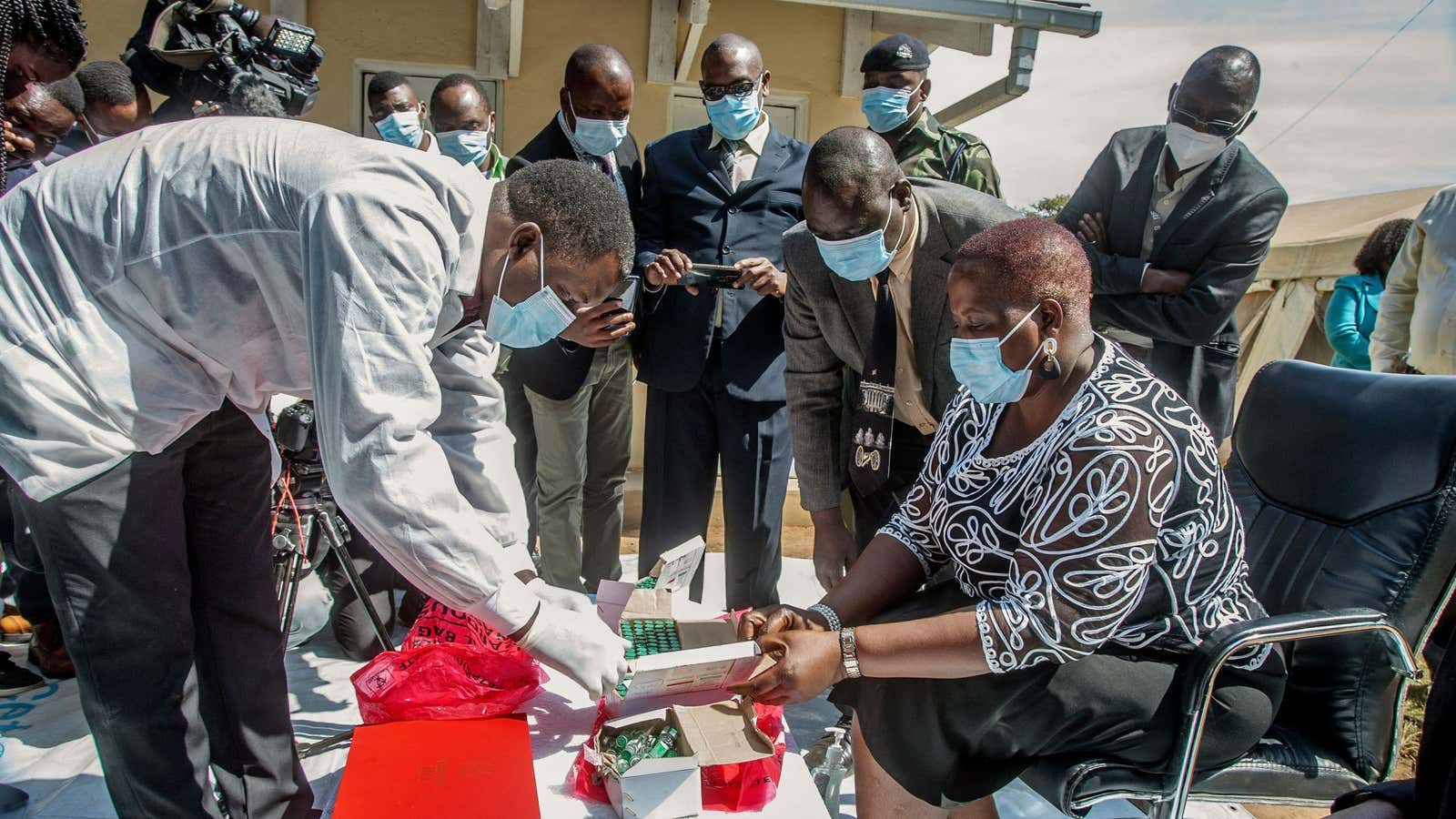The end of the coronavirus pandemic is not just dependent upon getting enough people to accept a vaccine. It will require addressing the misinformation crisis at the same time.
The uneven distribution of vaccines in Africa is a clear example. Only 2% of the continent’s population has been vaccinated, in part because there aren’t enough vaccines available. But even with the few doses available, vaccine availability means nothing without vaccine acceptance, and hesitancy is rife.
Anti-vaccine misinformation and disinformation, which has been disseminated unchecked on social media, is a key part of the toxic equation (in addition to outright greed on the part of Western countries and ineptitude on the part of African governments). Doctors have complained that this misinformation is slowing the vaccination and recovery process, and could be eroding trust in science and public health when we need it most.
The clearest indication of the damage misinformation is doing can be seen in the emerging trend of vaccine expirations and redistributions.
Malawi last week destroyed nearly 20,000 doses of the AstraZeneca vaccine that expired in mid-April. Its health minister blamed propaganda for many Malawians refusing to receive the AstraZeneca jab. South Sudan also has around 59,000 doses which it also plans to discard. The DRC, meanwhile, says it cannot use most of the 1.7 million AstraZeneca doses it received and by late May had administered only about 14,000 of the doses. Hesitancy has been at the core of its roll out failure despite the use of a vaccine being pivotal in tackling the Ebola virus there. Kenya also recently announced that it intends to redistribute close to 200,000 vaccines to regions with higher demand due to slow uptake in others.
“People are skeptical,” the director of a Kinshasa hospital recently told the AFP. “Many are afraid because of rumors they are seeing on social networking sites.”
Misinformation about the Covid vaccine has been circulating on African social media communities since long before its development and arrival on African shores. On a personal level, many people I’ve spoken to are struggling to get their parents vaccinated before the initial consignments run out. They have had to contend with the task of convincing their parents against conspiracy theories that have made them reluctant to get the jab. In many of these conversations, content that has been viewed on social media often takes center stage, revealing the complicated web of political, moral and medical objections to vaccines.
The challenge of religious disinformation
Facebook, Twitter, TikTok, YouTube and other social media platforms have instigated a number of policies to help slow the spread of dangerous vaccine disinformation. Yet as various investigations have shown, these policies have been inadequately and inconsistently applied. For example, misinformation fuelled by religious beliefs is proving to be an especially resilient and pervasive form of misinformation, and has become deeply entrenched in the platforms, taking advantage of the seeds of mistrust that were already growing amongst multiple citizens.
This presents an incredible challenge given the influence religious figures command offline in Africa. Many pastors’ sermons and services are televised, making them prominent fixtures in African homes. Misinformation often spreads from the pulpit to people’s mobile phones, amplified by local media outlets or politicians and influencers, who give a megaphone to their claims given the prominence of these individuals.
Recently, a video of South Africa’s Chief Justice Mogoeng Mogoeng stating that the vaccine was the “mark of the beast” went viral after being tweeted by politicians and influencers. The video is still circulating on Twitter today, likely receiving hundreds of thousands of views. This misinformation is not limited to religious leaders. In Kenya, the Catholic Doctors Association had a press release doing the rounds on Whatsapp claiming that the Pfizer vaccine causes autoimmune diseases.
Religious content moderation presents a distinct challenge for moderators and fact checkers: How do you moderate beliefs without infringing on freedom of speech? There are statements by religious leaders regarding health and other issues for which there is verifiable information. However, there are religious statements that are interpretations of religious text that give factual occurrences a religious explanation, and are anchored in religious belief. Fact checkers have expressed difficulty in dealing with this. It’s also impossible to fact check the future and on what grounds would you moderate it? This is the murky ground in which conspiracy theories tend to take root.
Turning off the taps of vaccine misinformation
Researchers and reporters were sounding the alarm bells about the dangers of health misinformation problem long before the pandemic. Yet there continue to be countless miracle cures for other ailments such as AIDS and cancer being sold through social media ad networks by fraudulent individuals, who amass large followings thanks to the platform’s algorithms. The anti-vaxx movement has been allowed to grow and reach the four corners of the internet, with real-life consequences. Big Tech needs to stop waiting to address problems long after they know they exist.
Some of the solutions aren’t complicated. Facebook’s Mark Zuckerberg, Twitter’s Jack Dorsey and the other demigods of Big Tech need to pay attention to the African ecosystems of their platforms, and turn off the toxic taps completely for religious and political leaders who spread lies not only about Covid and vaccines, but other forms of health misinformation. They should also update their moderation policies in order to recognize the context in which vaccine misinformation is spreading on their platforms.
As health experts have warned, the reality is that there is no ending the pandemic without a sufficient proportion of the global population being vaccinated. Platformized misinformation is playing a part in prolonging the pandemic, and tech platforms need to be held accountable.
In the end, platforms will be judged not so much on the content they remove, but by what they let flourish.
Sign up to the Quartz Africa Weekly Brief here for news and analysis on African business, tech, and innovation in your inbox.
